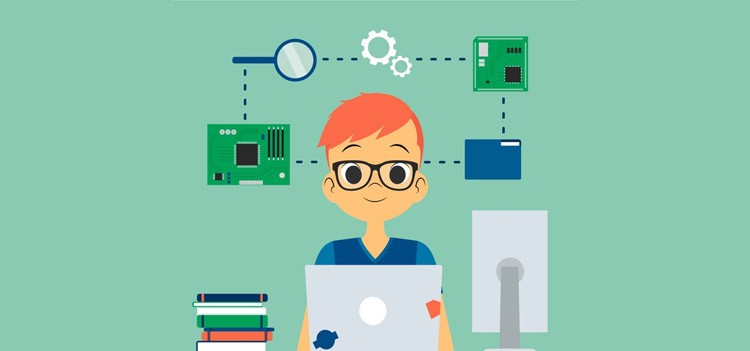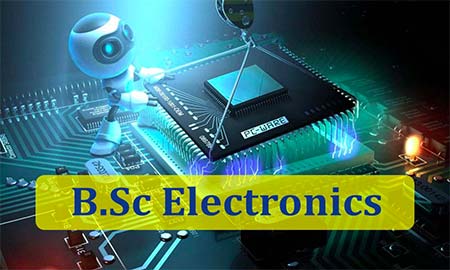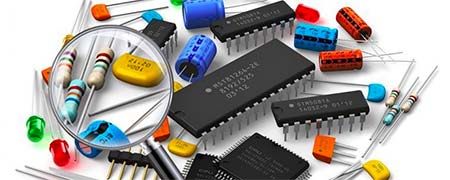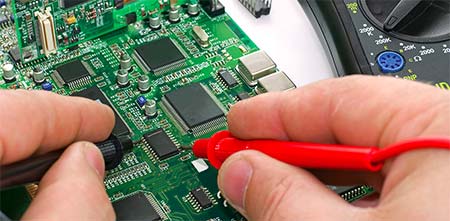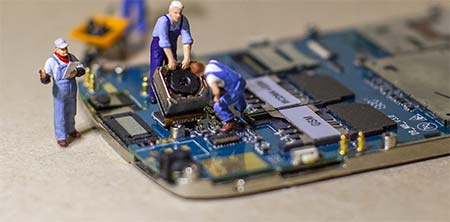Introduction to Electronics
Electronics is the branch of science that deals with the study of the flow of electrons and their effects in a vacuum, gases and semiconductor materials. Electronics basically deals with electronic circuits that involve active and passive components such as vacuum tubes, transistors, diodes, integrated circuits and sensors. Commonly, electronic devices contain circuitry consisting of active semiconductors with passive elements, such a type of circuit is known as electronic circuit.
Few lines about B.Sc Electronics
The B.Sc Electronics is a 3-year undergraduate course that is divided into 6 semesters. The course deals with the fundamentals of electronics and its applications. The aim of the course is to train the students on various subjects of electronics such as vacuum tubes, diodes, transistors and integrated circuits. The students will also be studying about numerous topics like Analog electronics, Network Analysis, Quantum Mechanics, etc.
The B.Sc Electronics course primarily deals with important aspects of electronics such as:
- Electrical Circuits
- Transistors
- Diodes
- Integrated Circuits
- Electronic Equipment
- Digital Electronics
- Analog Electronics
- Signals & Systems
- Microprocessors and Microcontrollers
- Communication Systems
- Computer Application
- Semiconductors
Eligibility for B.Sc Electronics
The students who have completed their PUC or 10+2 with any three of the following subjects: - Physics, Chemistry, Mathematics, Electronics or Computer Science from a recognised board are eligible to B.Sc Electronics course.
Combinations for B.Sc Electronics
The B.Sc Electronics course is usually studied in triple combinations, some of the important combinations available are:
- B.Sc Electronics (Honours)
- B.Sc Physics, Chemistry, Mathematics, Electronics
- B.Sc Computer Science, Mathematics, Electronics
- B.Sc Physics, Mathematics, Electronics
Admission Procedures
There are two types of admission procedures for getting admission to B.Sc Electronics. The first one is merit-based admission and second one is direct admissions.
Let’s discuss in detail about the admission procedures:
1. Merit Based Admission Procedure
There are many reputed colleges and universities that conduct entrance exams for B.Sc Electronics admissions. The students are allotted seats according to their performance in such institution-based entrance exams, such mode of admission is called Merit based admission procedure. The main idea of conducting entrance exams is to filter out the non-serious candidates from the serious ones. The qualified students are allotted merit seats for B.Sc Electronics course with nominal fee structure.
2. Direct Admission Procedure
The students also have another mode of admission that is called direct admission procedure. The students under direct admissions can get direct admissions to their desired colleges under management quota. The direct admission students are given special privileges, where they are exempted from attending any institution-based entrance exams and are not required to undergo any complex admission procedures. The students have the option to choose their desired colleges and book confirmed seats even before the college starts. The fees are slightly high for direct admissions. The students interested to get direct admissions can contact the educational advisory centres for more details.
Course Curriculum
The B.Sc Electronics students will be studying the following subjects in their course duration:
| Sl. No. | Subjects of Study |
|---|---|
| 1 | Basic Electronics & Instrumentation |
| 2 | Fundamentals of Analog and Digital System |
| 3 | Electronic Devices |
| 4 | Semiconductor Devices and Applications |
| 5 | Microprocessors and Microcontrollers |
| 6 | Analogue Communication |
| 7 | Communication Electronics |
| 8 | Radar, Television and Microwave Engineering |
| 9 | Numerical Analysis & Programming in C |
| 10 | Circuit Analysis |
| 11 | Linear Integrated Circuits |
| 12 | Digital Electronics |
| 13 | Signals & Systems |
| 14 | Digital Communication |
| 15 | Electronic Instrumentation |
| 16 | Microcontroller and Applications |
| 17 | Optical Fibres |
| 18 | Analog Circuits |
| 19 | Digital Circuits |
| 20 | Antenna and Wave Propagation |
| 21 | Electromagnetism & Ac Circuits |
| 22 | Amplifiers and Oscillators |
| 23 | Television & Engineering |
| 24 | Opto Electronics |
| 25 | Electricity & Electronics |
Career Scope for B.Sc Electronics Students
The advancement of technology has created ample job opportunities for B.Sc Electronics students. They can join electronic companies soon after the completion of their degree. If they are interested in higher studies then they can join M.Sc Electronics. They can join PhD programmes after their master’s to take up research in the electronics field. They can even join M.Phil programmes if they are interested to study in-depth about the subject.
They can also join colleges as assistant professors after the completion of their masters. The demand is abundant for B.Sc Electronics students in the industry.
Job roles available for B.Sc Electronics students
Some of the important job roles are:
- Service Engineer
- Broadcast and Sound Technician
- Electronics & Communication Consultant
- Electronics Technician
- Electronics Sales Manager
Salary Package & Emoluments
The fresh B.Sc Electronics graduates will be easily earning around 4 lakhs to 6 lakhs per annum. The experienced professionals will be getting around 6 lakhs to 8 lakhs per annum.
Top Companies Hiring B.Sc Electronics Students
Some of the important and top companies hiring B.Sc Electronics students are:
- Intel
- Havells
- Hindustan Aeronautics Limited (HAL)
- Videocon
- LG
- Samsung
- Jabil Flextronics
- AMD
- Atomic Energy Commission
- All India radio (AIR)
- Television Channels
- Hathway
- ACT Broadband
- Jio Fibre
- BSNL
- Airtel
- Crompton Greaves
- Bajaj Electricals
- Philips
Final Lines
The electronics field is gaining importance day by day with new innovations and technologies in this area. Many companies are investing more in development and production of consumer electronic goods and gadgets. The electronic gadgets are becoming a part of our lifestyle so there has been a demand created for such electronic gadgets. The demand for electronic gadgets has forced many electronic goods manufacturers to hire a large number of skilled electronic students. Hence, the B.Sc Electronics graduates are required more in number to develop and produce these electronic gadgets.
The increase in consumption of consumer electronic goods has created extensive career opportunities for the electronics graduates. The students who are interested in electronics and its applications can join the B.Sc Electronics course and get hired in lucrative job roles that pay decent salaries.

